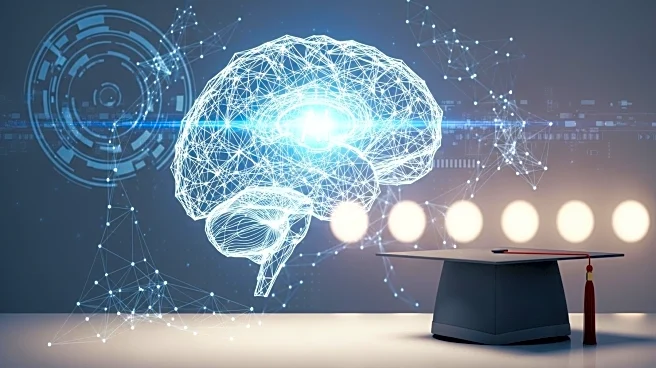What's Happening?
The rapid development and adoption of artificial intelligence (AI) are significantly impacting higher education, prompting a reevaluation of career plans for students and lesson plans for educators. According to the World Economic Forum, 70% of job skills will change due to AI. Many students are using AI for homework, finding it more helpful than traditional tutors. This shift has led to increased anxiety among students, with 51% reconsidering their career choices and 39% fearing job replacement by AI, as reported by Cengage Group's 2024 Graduate Employability Report. The article suggests that students should focus on developing Uniquely Human Capacities (UHCs) such as intuition, ethics, compassion, and storytelling, which AI cannot replicate. This approach aims to prepare students for a future where AI performs many technical tasks, emphasizing the importance of human-centric skills.
Why It's Important?
The integration of AI into the workforce is reshaping the skills required for career success, with employers increasingly seeking AI-savvy candidates. This trend poses a challenge for educational institutions to adapt curricula to focus on skills that AI cannot replace. Developing UHCs is crucial for maintaining human relevance in the job market, as these capacities enhance employability and personal growth. The shift towards UHCs also supports equity by addressing individual student needs and fostering meaningful connections. As AI continues to evolve, the emphasis on human-centric skills will help ensure that students are prepared for a dynamic and uncertain labor market.
What's Next?
Educational institutions may need to reallocate resources from technical skills that are easily automated to those that emphasize human interaction and creativity. This transition could involve revising curricula to prioritize UHCs and integrating AI tools to augment human capabilities. Policymakers and administrators might engage in discussions to ensure a just transition that enhances the unique value of humans in the workforce. As AI technology advances, ongoing adaptation and collaboration between educators, students, and industry leaders will be essential to navigate the changing landscape.
Beyond the Headlines
The potential for AI to simulate human-like capacities such as empathy and intuition raises ethical concerns about the future of work and societal interactions. The pressure on AI companies to deliver returns on investment could lead to increased costs for users and exacerbate inequalities. Additionally, the temptation to use AI shortcuts may hinder the development of critical thinking and analytical skills. Addressing these challenges requires a focus on nurturing UHCs and engaging with policymakers to ensure equitable access to AI technologies.









